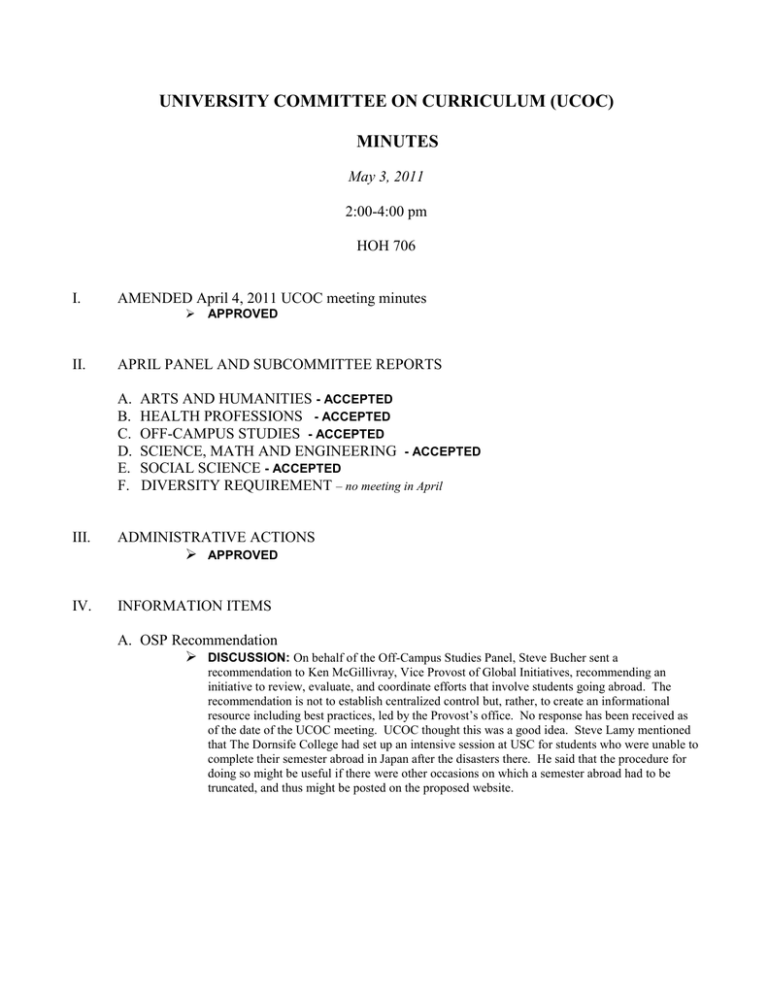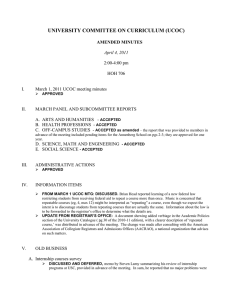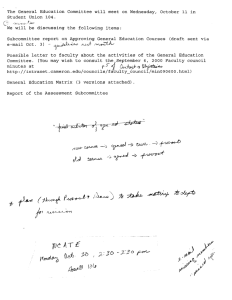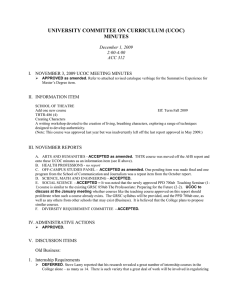UNIVERSITY COMMITTEE ON CURRICULUM (UCOC) MINUTES
advertisement

UNIVERSITY COMMITTEE ON CURRICULUM (UCOC) MINUTES May 3, 2011 2:00-4:00 pm HOH 706 I. AMENDED April 4, 2011 UCOC meeting minutes II. APPROVED APRIL PANEL AND SUBCOMMITTEE REPORTS A. B. C. D. E. F. ARTS AND HUMANITIES - ACCEPTED HEALTH PROFESSIONS - ACCEPTED OFF-CAMPUS STUDIES - ACCEPTED SCIENCE, MATH AND ENGINEERING - ACCEPTED SOCIAL SCIENCE - ACCEPTED DIVERSITY REQUIREMENT – no meeting in April III. ADMINISTRATIVE ACTIONS APPROVED IV. INFORMATION ITEMS A. OSP Recommendation DISCUSSION: On behalf of the Off-Campus Studies Panel, Steve Bucher sent a recommendation to Ken McGillivray, Vice Provost of Global Initiatives, recommending an initiative to review, evaluate, and coordinate efforts that involve students going abroad. The recommendation is not to establish centralized control but, rather, to create an informational resource including best practices, led by the Provost’s office. No response has been received as of the date of the UCOC meeting. UCOC thought this was a good idea. Steve Lamy mentioned that The Dornsife College had set up an intensive session at USC for students who were unable to complete their semester abroad in Japan after the disasters there. He said that the procedure for doing so might be useful if there were other occasions on which a semester abroad had to be truncated, and thus might be posted on the proposed website. UCOC Minutes May 3, 2011 Page 2 of 7 V. OLD BUSINESS A. Internship courses survey DISCUSSED and DEFERRED: Steve Lamy is drafting an addendum to the internship guidelines (see below). Prior to the meeting, he asked for clarification about whether non-faculty members may assign grades for internships. The guidelines for internship courses in the Curriculum Handbook were approved in 1996 and revised in 2006; they state the following [italicized text in brackets is for added clarification]: “A USC faculty member is the instructor of record for an internship course and is responsible for grading. If an onsite supervisor other than the instructor has input into grading, the proposal [for the internship course submitted to the UCOC] must make clear the nature of that input and how the USC instructor and supervisor will interact in the grading process.” Thus, the USC faculty instructor of records assigns the grades, and it’s acceptable for the on-site supervisor to assist in grading the student, but not for a staff member (non-faculty) to be responsible for the grading. The addendum to the internship guidelines is forthcoming. FROM THE MINUTES OF THE 4/4/11 UCOC MEETING: DISCUSSED AND DEFERRED, memo by Steven Lamy summarizing his review of internship programs at USC, provided in advance of the meeting. In sum, he reported that no major problems were found in the implementation of internships at USC. The professional schools monitor the process carefully and provide the greatest support both in matching students with internships and monitoring the experience during the term. Problems that surfaced during the information-gathering phase of the internship survey (such as staff members providing grades for one program) are being addressed. A well-timed recent New York Times article indicated that evidence shows that students doing internships are being exploited. The article included a recommendation that programs should not require internships, and that paying for internships (in the form of tuition for a course) should be avoided. The UCOC’s response is the benefits outweigh the problems, especially if it’s 1-unit course and the course integrates the internship into the program, and includes a structured faculty mentor experience. UCOC suggested that the general observations be developed into a ‘top ten’ list for inclusion in the curriculum handbook, specifically as an addendum to the internship guidelines already there; Steve Lamy agreed to draft it. FROM THE MINUTES OF THE 3/1/11 UCOC MEETING: NO NEW INFORMATION TO REPORT. FROM THE MINUTES OF THE 2/1/11 UCOC MEETING: DEFERRED: Work continues on the report. FROM THE MINUTES OF THE 1/11/11 UCOC MEETING: DISCUSSED AND DEFERRED: Report by Steve Lamy report is in development. He reported that overall, most departments follow the guidelines; professional schools follow them more closely than non-professional schools. Findings include that some internships are paid and some are not; some schools leave it up to the student to find the internships and others excel in matching students with opportunities, and fewer departments have staff members assign grades than initially assumed/reported. A best-practices template will be developed and should be posted along with the internship guidelines in the Curriculum handbook. Recommendations are expected to include requiring pre-approval of internships and that the grade be assigned by a faculty member (NTT OK), not staff. It was also noted that medical clinical experiences are not internships covered by these guidelines. A report is in process, to be provided for the February UCOC meeting. FROM THE MINUTES OF THE 12/7/10 UCOC MEETING: DISCUSSED AND DEFERRED. A summary of the responses was provided at the November meeting. An ad hoc committee of Steve Lamy, JoAnn Farver, and Richard Fliegel was formed at that meeting. Steve Lamy was unable to attend the meeting; Richard Fliegel attended in his absence, and reported that the ad hoc committee has yet to meet. B. Sample Syllabus Template DISCUSSED AND DEFERRED: Suggested changes to the sample syllabus template were provided by Susan Metros and her staff, and sent to the UCOC in advance of this meeting. They have more suggestions and have volunteered to make further revisions to the online course portion of the template; UCOC agrees that their input will be welcome. The proposed revisions are to be provided to the UCOC early in the fall semester. UCOC Minutes May 3, 2011 Page 3 of 7 (See below for more discussions on the Sample Syllabus template under new business, below.) APPROVED: The SES co-chair raised the question (which had been raised by the faculty who proposed EE-525, on today’s agenda) whether the sample syllabus template is sufficiently explicit in asking for description of assignments. It was proposed and approved to add the following statement on page 1, under “Course Requirements and Grades,” as an additional bullet point just above “Grading breakdown”: “Substantive description of assignments to be required in the course.” FROM THE MINUTES OF THE 4/4/11 UCOC MTG: DISCUSSED AND APPROVED, as amended, edits to the sample syllabus template made by Juliet Musso, adding elements of faculty involvement and expectations of student work effort, which was distributed to UCOC members in advance of the meeting. Discussion took place about the extent to which the template must address difficulties due to firewalls at workplaces and the varying software and hardware used by students. Curriculum Office is to contact the Office for Technology Enhanced Learning regarding the statement about ‘post-speaker remorse’ to determine if that is necessary – either required by the General Counsel’s office or strongly encouraged by the Office for Technology Enhanced Learning. Amendments are to add the new sentence in the first paragraph about learning objectives as an additional bulleted item in the new section on pg. 3, and add ‘operating system and software’ to the new bulleted items on pg. 4 regarding what is needed to access the course. FROM THE MINUTES OF THE 3/1/11 UCOC MTG: DISCUSSION: Susan Metros, Deputy CIO and Associate Vice Provost for Technology Enhanced Learning, attended the meeting to discuss matters of concern to UCOC members regarding distance learning. The main purpose of Technology Enhanced Learning is to help faculty with the use of technology – often including distance learning technologies – to support teaching and learning. The majority use Blackboard or PowerPoint or clickers; some teach hybrid, utilizing online resources in conventional classes. Fewer have totally online courses and programs, and these are exclusively professional programs at the Masters level – Academic Medicine in Medicine, Regulatory Science in Pharmacy, Master of Arts in Teaching in Education, Master of Social Work, Gerontology, Geographic Information Science Technology, with plans for online Masters in Policy, Planning and Development, and in Communication. In every case, the online program is either offered on campus, or it is possible to offer it on campus. President Nikias has repeatedly stated that the undergraduate offerings should be residential. The Center for Excellence in Teaching has a group that will go through a faculty member’s syllabus to suggest ways to integrate distance learning into it. They also are interested in looking for ways to leverage research opportunities into the undergraduate classroom via distance learning. Committee members raised issues of concern, such as the difficulty determining contact hours in distance learning syllabi. Both DL and on-campus courses are expected to meet the Carnegie guidelines for faculty contact, but “faculty contact” occurs in different ways for DL courses. All our DL courses have some synchronous contact (eg, students and faculty discuss simultaneously, with each participant displayed on the screen). However, other types of activity (such as student discussion groups monitored by faculty) can also be considered “faculty contact.” Juliet Musso reported that syllabi she reviewed for the MAT program did not initially make it clear what was happening that constituted faculty contact; this needs to be spelled out more clearly in the syllabi so faculty, students, and UCOC reviewers can see what is happening. This is an issue for both distance learning and non-distance learning syllabi, but for programs that offer a 15-week semester’s worth of material in a 10-week term it is even more difficult. If it is properly managed it can be possible to make sure that students get the faculty contact they are paying for. It has always been possible for students to attend an on-campus course but not engage in it; the same is true for online courses, but the technology to assess student progress through the material makes it easier to assess student engagement. “Distance Learning starts with the fourth row back.” Learning outcomes and assessments should be at least roughly the same for the same course offered in person, hybrid and totally online. Online courses more typically use a final project or paper as the final requirement, rather than exams. Susan Metros said that Engineering (DEN) is the only online program that gives final exams. There seemed to be consensus that asynchronous learning in online courses should be counted as contact hours, if it’s done properly. The UCOC wishes to find ways to be effective as a committee to ensure adequate faculty contact in online courses. Better descriptions and instructions are needed for departments and schools for how to construct a syllabus that spells out what’s expected. The Curriculum Coordination Office website could be expanded over time to give more help to faculty who are developing DL courses. The sample syllabus UCOC Minutes May 3, 2011 Page 4 of 7 template (or other information on the website) should provide explicit information about the expectations for faculty contact according to the Carnegie guidelines, and the types of activities that constitute “faculty contact” in both in-person and DL courses, This is an opportunity to help faculty understand how to carefully craft a high quality distance learning experience. When a department adapts an on-campus course to be offered online, it is not necessary to put it through curriculum review unless it is changing more radically in the process. The delivery modality is at the discretion of the deans. Even though the assessments might change, the faculty member is still assessing whether the student mastered the material. The nature of faculty contact will differ, but students in online courses often report that their time with faculty and their interactions with other students are rigorous. VI. NEW BUSINESS A. QUALITY, CONSISTENCY AND RIGOR OF CURRICULUM PROPOSALS: 1. 2. 3. 4. DISCUSSION: Concerns about the overload of proposals to review for the March meeting and the last meeting of the year were discussed. Sometimes ten days is not enough time for the subcommittees to make decisions when the number of proposals is too great. The Curriculum Office provides a ‘deadline’ in January for proposals to be approved at the March meeting. This should provide sufficient time for the CCO and the subcommittee to review the proposal, to send it back to the department (if necessary) for their internal department and school-wide review process, and get it back to the Curriculum Office for a decision by the subcommittee. However, proposals that are complete, accurate, and straightforward can be (and are) approved much more quickly. Concerns about difficulty getting second reviewers to review program proposals, and concerns about the mechanics of the process of proposal review in general, were discussed. Subcommittee co-chairs indicated that for the 2011-12 academic year they would prepare and send to their subcommittee members an email indicating the typical load of the past year, asking if there are times when they will not be available to do reviews; clarifying expectations of what they want subcommittee members to provide. For example, subcommittee members might be given examples of the level of detail expected in their reviews, and they should be reminded that their comments should make clear whether they approve or not. The CCO will provide a template that subcommittee co-chairs might use to prepare this email to subcommittee members. Also, perhaps there could be a reminder to approve or not in the box in CMS where they should put their comments. (Subcommittee chairs were provided with a list of their program proposals and the first and second reviewers for each.) Statistics showing the number of proposals reviewed this year and last were provided. There were significantly more curriculum proposals processed this year than last—171 programs compared with 123 last year, 630 courses compared with 509 last year (not including the 150 courses that were ‘purged, due to not being offered for 3-5 or more years). The increase was especially marked for OSP, partly (though not entirely) due to OSP’s decision to review short trips—a total of 82 proposals this year compared with 33 last year. As last year, AHS and SSS have the most, HPS the least, SES in between. When the load is very great for one subcommittee, the chairs of less-busy subcommittees can pitch in, as was done during the 2009-10 academic year. Student involvement continues to be desired, but subcommittee members haven’t reached out to them. Some students were unable to attend meetings that were scheduled due to their own class conflicts. UCOC was asked to think about the issue of student involvement and discuss the issue further next fall. It was determined that no School deans will need to receive a meeting from Tom and the provost due to poor quality, inconsistent proposals and lack of rigor. FROM THE MINUTES OF THE 4/5/11 UCOC MTG: Tom Cummings reminded panel and subcommittee co-chairs to review the last year’s proposals and identify those that raise concerns about quality, consistency, and rigor for discussion at the May meeting. Difficulties getting subcommittee members to serve as second reviewers, and concerns about the mechanics of the process of proposal review, were raised as problematic issues. Some Curriculum-related committees continue to have meetings, such as the General Education and the Diversity Requirement Committees, but the subcommittees dispensed with that as a general practice when the new system was instituted starting in 2006-07. An additional topic for discussion is the lack of input from students, since they are not used as second reviewers, and since there are so rarely meetings for them to attend. UCOC Minutes May 3, 2011 Page 5 of 7 B. REFERRED FROM THE APRIL 2011 SES MINUTES/REPORT: Viterbi School of Engineering Revise One Course Effective Fall 2012 EE-525 Electrical Engineering Power System Protection (3) Theory of system and equipment protection, characteristics of relays, relay coordination, and system considerations. (3) Current prerequisite: EE-510. New prerequisite: EE-443. The SES co-chairs’ concern was about the quality of the syllabus, not the change to prerequisites. They felt it was poorly constructed and provided insufficient information about the course objectives and homework. Further details are in the comments in CMS. FROM THE APRIL 25, 2011 SES MEETING: DISCUSSED AND DEFERRED. To be routed back to the department for additional materials. Margie Berti and Ed Maby attended the meeting. Subcommittee chairs indicated they thought that since the course has been offered already for some time it might not be difficult to obtain a sample assignment for the purpose of providing the information (i.e., examples of homework assignments) they say is missing from the syllabus. After the meeting, the department decided not to revise the syllabus and asked that it be accepted or rejected as is. If rejected, they wanted UCOC to review it. It is now on the UCOC agenda. NOT APPROVED. After considerable discussion, UCOC supported the opinion of the SES co-chairs that the assessment section of the syllabus is unclear. As SES had originally requested, additional narrative describing the difficulty level and the types of assignments is needed, or alternatively, examples of the types of problem sets assigned, which would give an idea of the level of difficulty, could be provided. A note to Associate Dean John O’Brien is to be sent. It is recommended that a sample syllabus be provided that gives them a clearer idea of what is requested (several Engineering syllabi received recently have been exemplary). It was noted that the level of detail regarding assignments that is required for students to know what is expected of them before taking the course varies by discipline and by level of course (undergrad vs. graduate). The department stated that the sample syllabus template on the CCO website doesn’t explicitly require description of homework to the degree the SES subcommittee requested. The revision to the sample syllabus template described above should make expectations clearer. The UCOC members recognize that the proposal is to request a change to the required prerequisite, and their objection is not to this revision but to the clarity of the syllabus. However, UCOC views its role, in part, as working with faculty and academic units to create syllabi that communicate clearly to students about our courses, especially workload expectations, grading standards, and the like. It is time-consuming to do this. One reason that the departments push back when asked to provide more information is that when a proposal is bounced back to the department, it may have to go back through a school’s curriculum committee. NOTE: it is therefore not possible to drop EE-510, which was on the Administrative Actions report, but will be removed. UCOC Minutes May 3, 2011 Page 6 of 7 C. COURSE AND PROGRAM APPROVAL BY AFFECTED DEPARTMENTS/DEANS DISCUSSION: It came to light this semester that sometimes courses lack consent by an affected unit. Also of concern is that it is unclear what constitutes affected unit acknowledgement, and we can’t always be sure that a dean has actually checked with the department in their school that is affected. Members generally felt that the “affected deans” should check proposals with the relevant departments in their schools before signing off, even though that will slow down the review process. (Affected departments should be contacted, and sign-offs received, before proposals are sent to the Curriculum Office, as the CCO and the subcommittees are not always able to determine which schools are affected, although they attempt to.) D. LAPTOP AND CELL PHONE USE IN CLASSES, AND INCREASED ABSENTEEISM NOT ON AGENDA BUT DISCUSSED: DEFERRED: Steve Lamy brought up two issues which are of concern to many faculty, although it is not clear if either UCOC or CAPP has jurisdiction in this area. One is whether or how to ban the use of laptops or phones in the classroom, and the second is how to deal with students not attending class. In some student subcultures, students think that if lectures are online, there is no point in going to class. It was suggested that sample statements about the use of computers and phones might be provided for faculty who wanted to use them. It was pointed out that a faculty member may not assign points for attendance, but may subtract points for absences. Faculty could be reminded of the control they can exert on attendance by reducing grades for non-attendance. These topics will be discussed further in the fall, after gathering information about it over the summer. UCOC Minutes May 3, 2011 Page 7 of 7 Members present Members absent Hans Bozler Stephen Bucher Thomas Cummings (chair) Frances Fitzgerald (staff) Brian Head Steven Lamy (ex-officio) Janet Levin Chi Mak Frank Manis Juliet Musso Sally Pratt (ex-officio) Mark Todd (for Michael Quick) Edwenna Werner (ex-officio) Aimee Bender Gene Bickers (ex-officio) JoAnn Farver Judith Garner Jerome Grand’Maison (student) Katharine Harrington (ex-officio) Sandra Howell David Ji (student) Michael Quick (ex-officio) Lynn Sipe (ex-officio) Guests


